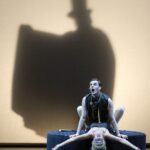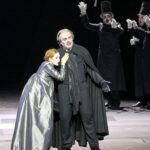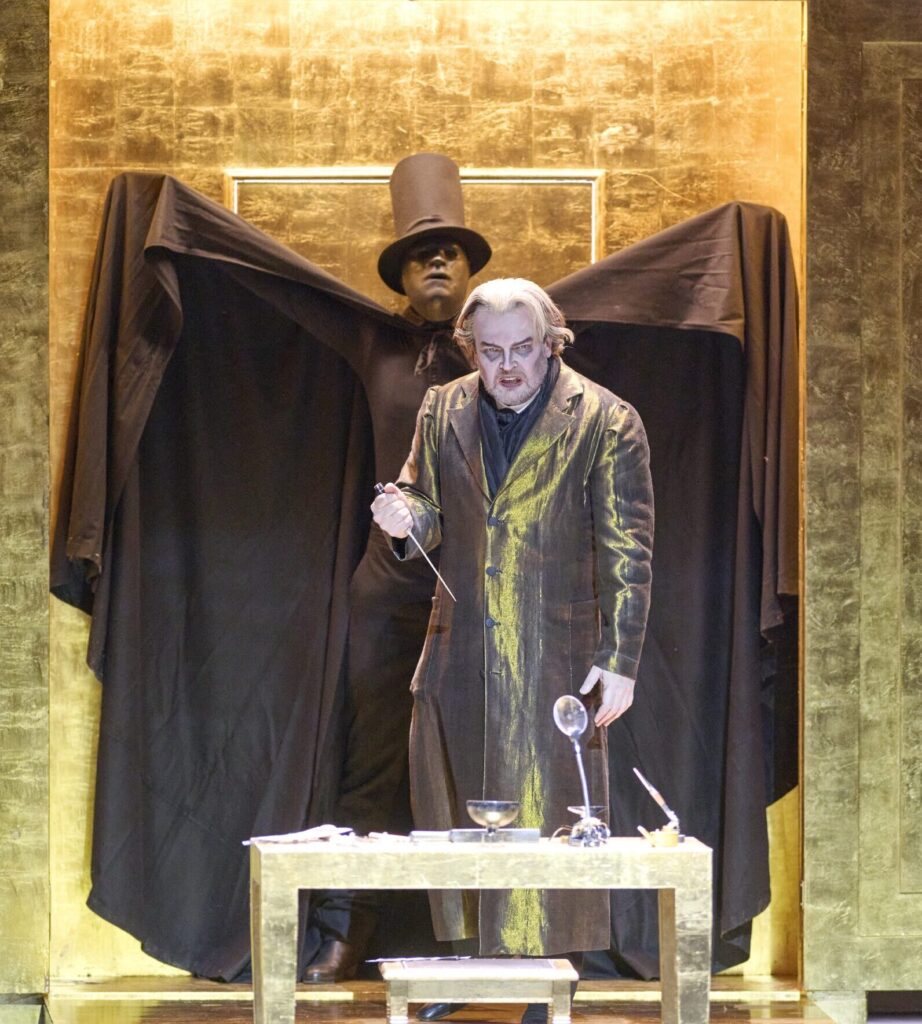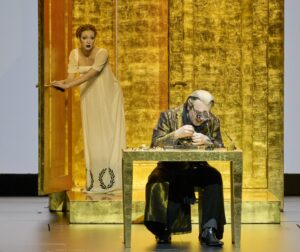Hindemith’s opera (libretto Ferdinand Lion) is about the problematic relationship beteween an artist and his creation. Once completed, sold, is it still his property? Cardillac is about obsession, and the loneliness of the artist.
Cardillac premiered in 1926, a modernist work, controversial even for its time, it raises deep philosophical questions. Sven-Erik Bechtolf’s revived Vienna State Opera production is spectacular; Rolf Glittenberg’s stage (costumes Marianne Glittenberg) beautifully evoke a mysterious art-deco world of the 1920s.
Brutal, staccato rhythms. wind and brass instruments predominate, as Hindemith uses a ‘chamber orchestra’ with reduced string section (Vienna State Opera Orchestra, Cornelius Meister.) The music drives forward like a motor. Modernist, but Hindemith’s music, (for 1926), is accessible, ‘the rhythmic accents are in the melody.’ And there’s a jazzy input, including four jazz drums, the tenor saxophone representing Cardillac.
‘An animal is prowling the streets’, sing the Chorus (Vienna State Opera’s), wearing black, in top hats- their faces, whitened- vigilantes standing for the moral order. Slash them with knives, bombard them with stones! The stage scenery is of a modern cityscape, with skyscrapers slanting as if toppling over. A nightmare, apocalyptic vision, Bechtolf had Fritz Lang’s Nosferatu in mind; Glittenberg’s stage reflects silent German expressionist cinema.
The ‘Burning Chamber’ (medieval sounding) is invoked by the Provost-Marshal to investigate. ‘When thieves stab those with jewellery in dark corners, they’ll feel their wrath.’
In the opera, only Cardillac has a name. The others are ‘types: the Daughter, the Officer generalisations; but Cardillac, the artist figure, is individualised. The Lady sings to the Cavalier of the city in panic over crime. Mezzo Stefanie Houtzeel sings, Cardillac is respected, revered like a god; but it’s rumoured those buying his jewellery are murdered. Yet she asks the Cavalier (Daniel Jenz’s fine tenor) to buy her ‘the most beautiful piece that Cardillac has ever made.’
In the next scene, on a stage enclosed by red curtains, the Lady reclines. Time flies, the rose has withered. In her stylised aria, Houtzeel sings, she longs ‘to be beneath him, but not yet.’ Their music is lyrical. The night wind blows, her lips are cold.
The Cavalier comes with the desired jewellery, a gold chain. She takes the gift, which is overlooked, in their love-making, (more and more into each other.) As they’re consumed deeper in passion, a spectre, the shadow of a man in top hat, looms over them. In a flash, (we should see) ‘one hand take the jewellery, the other breaking the neck of the Cavalier.’
Cardillac is at his desk. Tomasz Konieczny, in a gold cloak, looks sacrificial, like the head of a cult/religious order. Konieczny, who sang Cardillac in 2015, increasingly identified with the role. Now his hair’s lighter, greying, radiating a gold colour. His magnificent bass-baritone, deeper, yet supple, expresses the exquisite torture of the creative artist. ‘Now obey me’- fashioning a piece of jewellery- ‘so I can love you.’
He’s visited by the Gold Dealer (Wolfgand Bankl), who describes him, ‘of all the masters, he’s the most exacting.’ While at first flattering Cardillac, his hand is shaking… Once again, last night, he sings, a purchaser of his jewellery was murdered.
The Daughter, the beautiful Vera-Lotte Boeckler, (her soprano impressed here in Henze’s Sea Betrayed), appears in a white gown embossed in gold – emerging out of a gold doorway. Cardillac’s daughter, she’s conflicted: in love with the Officer, but loathe to leave Cardillac. Boeckler’s soprano- acclaimed in 20th century roles- sings, ‘You have no idea how he is when he must sell one of his works, it pains him terribly’; she hears his sobs.
Yet she belongs to him, and her Officer. Don’t break my undecided heart in two! Standing behind Konieczny, Boeckler sings of the tormented joy of a divided heart. He, only the joy of his creation keeps him on this earth.
The Officer (sensitively sung by lyric tenor Herbert Lippert), entering the workshop, bids for Cardillac’s daughter. He desires the most beautiful of his creations. But the possessive father sees him as a thief. The Officer sings of his love, Cardillac, ‘only that which he’s created stays loyal.’ The Officer insists on buying a gold chain: they haggle, he wins. Cardillac, sings passionately, out of his jewellery, flows his magic. The Officer claims the chain; ‘the Daughter will be his own property.’
Cardillac again sitting at his workdesk. An ornate cabinet behind him appears to lead into a labyrinth of gold rooms. To a saxophone accompaniment, Be still, my soul, Sei still, seele mein. A black figure, opens out, as if to envelope him, a devilish incarnation. Diving into rivers of blood, he’ll take back what is his! The Lady kicks the iconic stage clock, that rolls forward.
Opening Act 3, Cardillac jumps out and stabs the Officer, who’s slightly wounded; but leaves, observed by the Gold merchant, who calls the police, suspecting Cardillac’s the serial killer. Konieczny arrested, pleads desperately, he must continue his work!
The Daughter, broken free of her possessive father’s power, Boecker sings exhilerated, (perhaps Freudian release?) The Officer, jubilant, will ‘disrupt the night with drunken songs’, accompanied by tavern music, the band on stage.
Now a frightening scene as Cardillac is stopped, at the mercy of the mob, demanding to know the criminal’s identity. Crypically, Konieczny, ‘his secret will be mine forever.’ They’re seeking payback, ‘a bounty of justice.’ He’s defiant, until they threaten to storm his house. Am I to see my unborn creatures die before they live? Finally, he confesses, I am the man, Ich war es, ich bin’s!  The Daughter, Boecker, lies in a heap at his feet. How could he be capable of such deeds? she sings – He, ‘Exernal life has no worth for him without his creations.’
The Daughter, Boecker, lies in a heap at his feet. How could he be capable of such deeds? she sings – He, ‘Exernal life has no worth for him without his creations.’
We see the crowd, black, crow-like figures, encircling Cardillac, and the horror of synchronised stabbing movements, lunging at him.
Yet the Officer confronts them, who were they to judge. He, Cardillac, was the victim of a holy delusion. On this deathly night a hero died, (Ein Held starb.). Boecker movingly sings, ‘Give me your hand, and bring me back to the living through your love.’ Now, centre-stage, statue-like, a monument to Cardillac, wearing a gold top-hat, gloves, holding a necklace- Konieczny as if turned to stone. ‘He is victorious, and I envy him’, sings the Officer; the earth is ewig lautlos, eternally silent. © PR. 5.11.2022
Photos: Daniel Jenz (Cavalier), the Lady (Stephanie Houtzeel); Vera-Lotte Boecker (the Daughter), Tomasz Konieczny (Cardillac)
© Michael Pöhn/ Wiener Staatsoper


